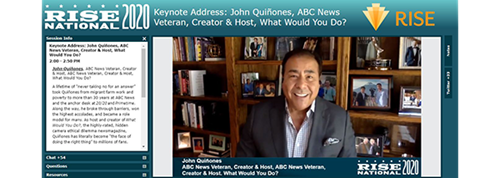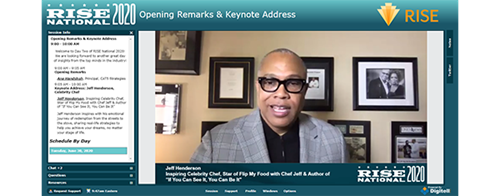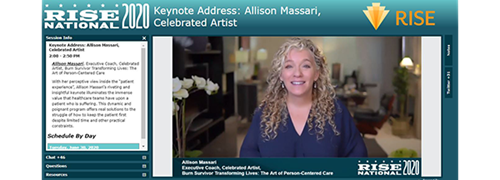Phenomenal keynote speakers took the virtual stage over two days at the annual event, RISE National 2020, and offered stories of hope and perseverance during the darkest of times.
In a world of ethical dilemmas, John Quiñones lights the way to the moral high ground
Weeks after speaking at RISE’s National Summit on Social Determinants of Health, Emmy Award winning journalist John Quiñones returned as the keynote speaker for RISE National 2020 but with a different message for the audience. As the creator and host of the long-running, hidden camera show, What Would You Do?, Quiñones has become the face of doing the right thing when confronted with moral and ethical dilemmas.

The new season of the television program premiered this week and provides a look at how ordinary people react when they witness any kind of injustice, including bullying, racism, and attacks on the LGBTQ community. Do they step in or walk away? Although the scenarios were filmed prior to the COVID-19 pandemic, Quiñones says they are timelier than ever. He asked the attendees: if you could prevent the spread of a deadly disease, if you could simply wear a mask, would you do it? What would you do if you came face-to-face with racism or police brutality? Would you join the protestors or criticize them?
The dilemmas offer a true test of a person’s character, he said, because it shows what people do when they don’t know everyone is watching. “It’s the power of the camera when used in the right way,” he said.
Quiñones has made a career out of shining a light on injustice and providing a voice to those who don’t have a voice. One of the first assignments he ever covered as a news reporter in Chicago was on illegal immigration. He convinced the news director to let him go undercover and pose as a Mexican citizen trying to get into the United States. Quiñones recalled giving a smuggler $300 for a fake birth certificate and Social Security card to float on an inner tube to get to Chicago. Once there he got a job at a restaurant that had hired undocumented Mexican workers but never paid them. The owner told them that if they complained, he would have them deported. During the day Quiñones bussed tables and did the dishes, at night he interviewed the undocumented workers in Spanish about their lives and they explained to him they were being kept as virtual slaves in the basement for weeks and weeks without pay. The next day Quiñones, wearing business attire, brought along a camera crew and confronted the restaurant owner. The day after the segment aired on CBS television, the U.S. government moved in, shut down the restaurant, forced management to pay the workers the money they were owned and issued the workers temporary visas.
“I knew I was destined to tell the story and perhaps tell it better than anyone else,” said Quiñones, who described journalism as the candle in the darkness. The journalist is the person who can illuminate the darkest corners of society like corruption and civil rights violations. “When journalism is done right, these are the stories we should be telling,” he said.
From convicted felon to celebrity chef: Jeff Henderson’s life of redemption
Jeff Henderson, star of Flip My Food with Chef Jeff and the author of “If You Can See It, You Can Be It” shared his compelling life story of redemption through resilience.
As a young boy raised in poverty in South Los Angeles, Henderson developed a vision for the future at an early age: one with a large house on the hill, white picket fence, and an abundant fruit bowl on the kitchen table. “I always had this thought in my mind that one day I’m going to be in a position to help change the narrative in my family,” he said. “So as a young child, I always had the concept that if you can see it, you can be it.”
But hardships throughout his childhood didn’t make his dream an easy one to attain. Henderson watched his single mother, who worked several jobs, struggle to keep food on the table. The people in Henderson’s community who had money, nice cars, and beautiful apartments were the drug dealers, and Henderson wanted the same success for his family.

He started to go to school less and work alongside drug dealers more, mastering how to manage a crew of people and run a business on the streets. But he didn’t see the negative impact it had on his community. By the time he was 20-years old, Henderson was a millionaire but, he said, it was “at the expense of people who looked like me.”
In 1988, Henderson was indicted by the federal government and sent to prison. It was the darkest moment of his life, he said. “I knew mental toughness was going to be the key to me surviving prison.” Isolated from the life he knew, he read books, joined the Toastmasters program, and met people from around the world. “As a young black boy who didn’t travel and had limited knowledge of how the world works, for the first time in my life, in prison, I begin to understand diversity and how it’s so important in daily business and our lives,” he said. “How important it is to understand our values and cultures of others, which allows us to work in harmony at home and in our lives.”
Henderson discovered his natural talent for cooking when he was hired to the prison food service staff. He was eventually promoted to “chief inmate cook” and even developed an underground catering business to further his motivation.
After almost a decade, Henderson was released from prison, and with the same vision he had since he was a child, he aimed to build the life he always dreamed of.
With resilience, never-ending hope, and a clear vision of the future, Henderson got his first job as a chef. He continued to grow his career and became the first African American named “Chef de Cuisine” at Caesars Palace and the first African American executive chef at the Bellagio. He later became a star on his own television shows and a best-selling author.
Henderson credits his transformation to his faith, mental toughness, and hope, all of which he urged others to cling to amid such uncertain times. “No matter what we face in these trying times, we are a resilient country. We are a resilient people. We are a strong American culture,” he said. “Now's the time not to divide but to unite under one dream: That American dream. It doesn’t matter the color of your skin, the socioeconomic background we come from. Our freedoms in this country are so valued and should be so cherished that we don’t do anything to divide us.”
The life-threatening accident that inspires Allison Massari to say ‘yes’ to life everyday
In a keynote address that brought attendees to tears, Allison Massari, an executive coach and artist, shared the gripping events of the treacherous automobile accident 22 years ago that left 50 percent of her body covered in second-and third-degree burns.
In what Massari thought were her final moments, engulfed in flames and consumed by excruciating pain, it was the anguish of loneliness that she felt the deepest, she said. “What this tells me is just how much we human beings need each other. We need each other. I had never known this depth of truth until I lived that fire.”

She spent 40 days in the burn unit and endured two major skin graft surgeries. Each day was filled with torment that was inescapable, said Massari. But it was the compassion from her caretakers and family that brought her to health and happiness. Massari recalled a moment shortly after she was rushed to the hospital when the nurse explained to Massari that her scalp was removed off the top of head and would need to be stapled down to her skull. It was the compassion of the nurse and a kind hand on Massari’s shoulder that gave her the strength to endure such an unimaginable moment, she said. “Without question, her kindness made it easier. I was calm. The fact that she took those extra few seconds to show that genuine caring made this torturous experience bearable.”
Once Massari was released, she faced years of grueling recovery and rehabilitation. After significant healing, she still struggled with the ability to raise her right arm due to scar tissue, so she reached out to physical therapists across the country hoping that one of them could help. But they all gave the same response: there was nothing they could do. But Massari wasn’t willing to take no for an answer and continued her search. Finally, a physical therapist in Colorado shared her optimism. With unwavering dedication to her health, Massari moved to Colorado to further her healing journey. She made progress every day until her arm healed completely.
It was the compassion and kindness from that physical therapist, her nurses, doctors, family, and friends that brought Massari to true healing, she said. “The world of medicine, the science and technology of it, takes people so far, and still there is a vital need for the human connection. From your presence,” she said. “Compassion heals the places that medicine cannot touch.”
Massari is now the founder of a camp for teenagers with severe burn injuries, The Roger Pepper Adventure Camp for Teen Burn Survivors, named after the man who pulled her from the burning vehicle that perilous night.
“We can trust this process of life,” she said. “Everything we go through; it has a job it can do on our being. Seek to find the good. Search with ferocity and have unbending belief.”
